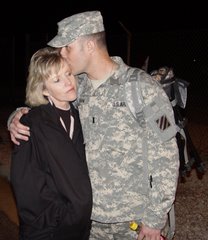 Capt. Brian Gilbert, from Boise, Idaho, commander of Company D, 1st Battalion, 15th Infantry Regiment, currently attached to 3rd Squadron, 1st Cavalry Regiment, enjoys a meal with members of the Zahara Local Community Council following a meeting with council members and local governmental leaders in Zahara, Iraq, Feb. 25.
Capt. Brian Gilbert, from Boise, Idaho, commander of Company D, 1st Battalion, 15th Infantry Regiment, currently attached to 3rd Squadron, 1st Cavalry Regiment, enjoys a meal with members of the Zahara Local Community Council following a meeting with council members and local governmental leaders in Zahara, Iraq, Feb. 25. Capt. Brian Gilbert, from Boise, Idaho, commander of Company D, 1st Battalion, 15th Infantry Regiment, currently attached to 3rd Squadron, 1st Cavalry Regiment, and Haydar Razzat, city manager of Jisr Diyala, attend a meeting between members of the Zahara Local Community Council and local governmental leaders in Zahara, Iraq, Feb. 25.
Capt. Brian Gilbert, from Boise, Idaho, commander of Company D, 1st Battalion, 15th Infantry Regiment, currently attached to 3rd Squadron, 1st Cavalry Regiment, and Haydar Razzat, city manager of Jisr Diyala, attend a meeting between members of the Zahara Local Community Council and local governmental leaders in Zahara, Iraq, Feb. 25.By Maj. Joe Sowers
3rd Heavy Brigade Combat Team,
3rd Infantry Division Public Affairs
FORWARD OPERATING BASE HAMMER, Iraq – Soldiers from Company D, 1st Battalion, 15th Infantry Regiment, currently attached to the 3rd Squadron, 1st Cavalry Regiment, sat down with community and local governmental leaders in Zahara, a small town southeast of Baghdad, to facilitate communication between residents and their governmental officials, Feb. 25.
Leaders of the 3rd Heavy Brigade Combat Team recently began facilitating the development of Local Community Councils to improve communication between residents and their nahia councils.
“Local community councils help connect the government to the people,” said Maj. Andy Koloski, from Juneau, Alaska, executive officer for 3-1st Cav. Regt. “The lowest governmental body is a nahia council, but an LCC helps connect that body to the individual constituents through their tribal leaders. It is an essential element that merges democratic government with the traditional tribal structure.”
Koloski said the LCC is a good vehicle for citizens to interact with their local leaders. He also stated that such a step would not have been possible previously, due to security concerns.
“This meeting represents a huge step forward for the people of the area since they now have a venue to air their needs and concerns with some reasonable expectation that that government will hear them and take action,” Koloski said. “This would not have been possible in this area 10 months ago.”
Capt. Damond Davis, from Montgomery, Ala., fire support officer for 3-1st Cav. Regt., said the area used to be dominated by extremists, but the formation of a local Sons of Iraq group and increased cooperation with tribal leaders has improved security and communication between Soldiers and residents.
“When we first arrived, we were having trouble conveying the message that the government is here for the people,” Davis said. “The government was executing projects, but locals did not know that the government was working for them. Through the LCC, the people have a voice to the governmental leaders, but the governmental leaders also have a venue to speak with the people. It makes it easier to quell rumors.”
The 3-1st Cav. Regt. and the 1-15 Inf. Regt. are assigned to the 3rd Heavy Brigade Combat Team, 3rd Infantry Division from Fort Benning, Ga., and have been deployed to Iraq since March.
3rd Heavy Brigade Combat Team,
3rd Infantry Division Public Affairs
FORWARD OPERATING BASE HAMMER, Iraq – Soldiers from Company D, 1st Battalion, 15th Infantry Regiment, currently attached to the 3rd Squadron, 1st Cavalry Regiment, sat down with community and local governmental leaders in Zahara, a small town southeast of Baghdad, to facilitate communication between residents and their governmental officials, Feb. 25.
Leaders of the 3rd Heavy Brigade Combat Team recently began facilitating the development of Local Community Councils to improve communication between residents and their nahia councils.
“Local community councils help connect the government to the people,” said Maj. Andy Koloski, from Juneau, Alaska, executive officer for 3-1st Cav. Regt. “The lowest governmental body is a nahia council, but an LCC helps connect that body to the individual constituents through their tribal leaders. It is an essential element that merges democratic government with the traditional tribal structure.”
Koloski said the LCC is a good vehicle for citizens to interact with their local leaders. He also stated that such a step would not have been possible previously, due to security concerns.
“This meeting represents a huge step forward for the people of the area since they now have a venue to air their needs and concerns with some reasonable expectation that that government will hear them and take action,” Koloski said. “This would not have been possible in this area 10 months ago.”
Capt. Damond Davis, from Montgomery, Ala., fire support officer for 3-1st Cav. Regt., said the area used to be dominated by extremists, but the formation of a local Sons of Iraq group and increased cooperation with tribal leaders has improved security and communication between Soldiers and residents.
“When we first arrived, we were having trouble conveying the message that the government is here for the people,” Davis said. “The government was executing projects, but locals did not know that the government was working for them. Through the LCC, the people have a voice to the governmental leaders, but the governmental leaders also have a venue to speak with the people. It makes it easier to quell rumors.”
The 3-1st Cav. Regt. and the 1-15 Inf. Regt. are assigned to the 3rd Heavy Brigade Combat Team, 3rd Infantry Division from Fort Benning, Ga., and have been deployed to Iraq since March.





No comments:
Post a Comment